|
|
|
Sort Order |
|
|
|
Items / Page
|
|
|
|
|
|
|
| Srl | Item |
| 1 |
ID:
125546
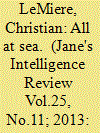

|
|
|
|
|
| Publication |
2013.
|
| Summary/Abstract |
More than 90% of global trade uses the sea, but the international community has so far paid little attention to ungoverned maritime spaces, Christian Le Miere analyses why policing the sea is a vital in disrupting the operations of non state armed groups.
|
|
|
|
|
|
|
|
|
|
|
|
|
|
|
|
| 2 |
ID:
129416
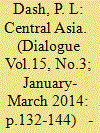

|
|
|
|
|
| Publication |
2014.
|
| Summary/Abstract |
In 2011-2012 all Central Asian countries have celebrated 20th year of their independence. They have achieved commendable progress in all spheres of their life during these years. Getting over from the monolithic ideology of communism, they have shifted to something that is not similar to any system. However, three areas are clearly discernible in the transition process of the last two decades: economy, society and ideology. The economy is no longer the command socialist economy. It is opening up, in some areas rapidly and in others slowly. Predominant private economic activities are visible in the market places. In laying the foundation of modern industry they are less visible. Foreign Direct Investment has been steadily flowing with varying degree of success in each country depending how investment savvy the FDI rules have been. The State has retained control over all spheres of economic activities. The society is no longer the communist one with free education and kindergarten, full employment guarantee to all, free housing, free medical care and many other benefits. All these have vanished. Everyone has to
fend for himself and his family. This is where it has created a schism between the haves and the have-nots thereby polarizing the society into rich and the poor. In the ideological realm, the Marxist-Leninist ideology has been completely given up. Even in academic libraries it is hard to find the works of Marx and Lenin that once adorned the shelves. Instead, works of incumbent presidents occupy the stacks. There is an irony: what the people wish to preserve, the presidents do not desire to protect.
|
|
|
|
|
|
|
|
|
|
|
|
|
|
|
|
| 3 |
ID:
132565
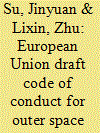

|
|
|
|
|
| Publication |
2014.
|
| Summary/Abstract |
The European Union draft Code of Conduct for outer space activities is one of the primary international initiatives, that are currently active, to enhance the safety, security and sustainability of outer space activities. Although the spirit underlying the instrument is commonly shared by space-faring countries, substantial disagreement exists among States as to some of its core provisions. This article proposes that the Code of Conduct should make a clear distinction between commercial activities and military activities, and adopt more balanced measures on the restriction of military activities in outer space.
|
|
|
|
|
|
|
|
|
|
|
|
|
|
|
|
| 4 |
ID:
118967
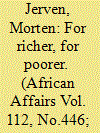

|
|
|
|
|
| Publication |
2013.
|
| Summary/Abstract |
ON 5 NOVEMBER 2010, GHANA STATISTICAL SERVICES announced that it was revising the GDP estimates upwards by over 60 percent, suggesting that in previous GDP estimates economic activities worth about US$13 billion had been missed. After the revision a range of new activities were accounted for, and as a result Ghana was suddenly upgraded from a low-income country to a lower-middle-income country. In the fall of 2011 Nigeria also announced a forthcoming upward revision of its GDP. Without presenting the public with any facts or figures, nor a date for the revision, it was announced by the director of the Nigerian Bureau of Statistics that Nigeria soon would join Ghana in escaping poverty according to official statistics.
|
|
|
|
|
|
|
|
|
|
|
|
|
|
|
|
| 5 |
ID:
137195
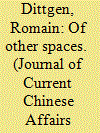

|
|
|
|
|
| Summary/Abstract |
Chinese economic activities in Africa have gained increased visibility in parallel to the recent acceleration of Sino-African relations. This paper, which is framed from a geographical perspective that is often absent or neglected in studies covering China–Africa, focuses on the spatial forms and dynamics. It depicts the way in which two contrasting Chinese economic entities – a state-owned company in Chad and privately owned commercial malls in Johannesburg, South Africa – engage with their respective host environments. While drawing on concepts of “liminality” as well as “heterotopias”, I argue that the modalities of the Chinese footprint are characterised both by closure and interaction, creating a dynamic tension that produces its own set of unique practices. This ambivalence between enclave and active linkages with host societies is not only perceivable from a spatial point of view, but also emerges with regard to economic strategies. In the midst of a transitional period, along with a launching and a consolidating phase, the Chinese economic entities in both case studies show signs of change in terms of behaviour and territorial foothold.
|
|
|
|
|
|
|
|
|
|
|
|
|
|
|
|
| 6 |
ID:
137196
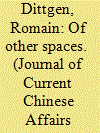

|
|
|
|
|
| Summary/Abstract |
Chinese economic activities in Africa have gained increased visibility in parallel to the recent acceleration of Sino-African relations. This paper, which is framed from a geographical perspective that is often absent or neglected in studies covering China–Africa, focuses on the spatial forms and dynamics. It depicts the way in which two contrasting Chinese economic entities – a state-owned company in Chad and privately owned commercial malls in Johannesburg, South Africa – engage with their respective host environments. While drawing on concepts of “liminality” as well as “heterotopias”, I argue that the modalities of the Chinese footprint are characterised both by closure and interaction, creating a dynamic tension that produces its own set of unique practices. This ambivalence between enclave and active linkages with host societies is not only perceivable from a spatial point of view, but also emerges with regard to economic strategies. In the midst of a transitional period, along with a launching and a consolidating phase, the Chinese economic entities in both case studies show signs of change in terms of behaviour and territorial foothold.
|
|
|
|
|
|
|
|
|
|
|
|
|
|
|
|
| 7 |
ID:
134142
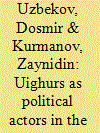

|
|
|
|
|
| Publication |
2014.
|
| Summary/Abstract |
In the Middle Ages, the Uighurs, who are one of the oldest and largest peoples of Central Eurasia (CE), were driven into East Turkestan and then conquered by the Qing Empire. The Chinazation policy carried out in relation to these people led to the mass exodus of the freedom-fighting Uighurs to the CE countries.
The Uighurs are vigorously engaged in economic activity; in other spheres they are traditionally closed and alienated from the outside world, which prevents them from becoming actively integrated into contemporary society.
This article analyzes the roots and reasons for this social phenomenon, which is having a certain influence on the foreign and domestic policy of the Kyrgyz Republic (KR), as well as on political stability and security of the entire Central Asian region.
|
|
|
|
|
|
|
|
|
|
|
|
|
|
|
|
|
|
|
|
|